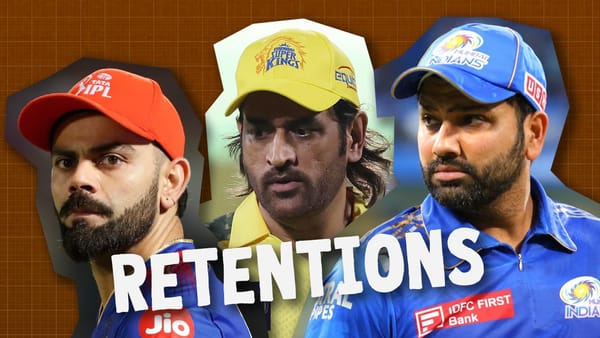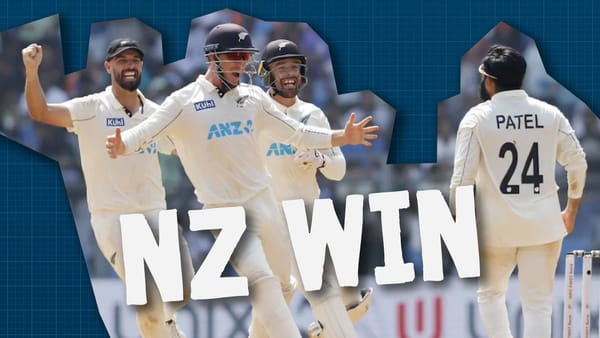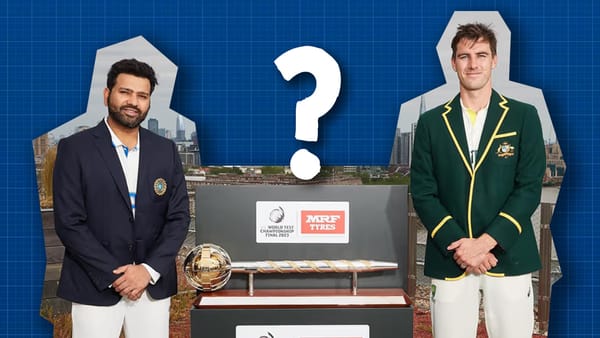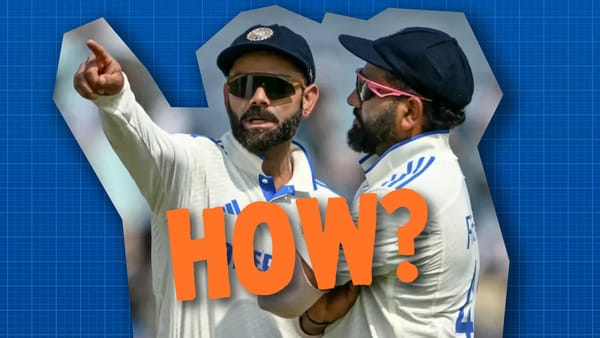The ODI Pinch Blocker Andy McBrine
McBrine, Imran Khan and the weirdest role in ODI cricket
Andy McBrine was the player of the series when Ireland just defeated the West Indies 2-1 in ODIs.
If you have no idea who McBrine is, he's a no-frills hard-working off-spinner who can bat-a-bit. But in that series, he was something more, their number three batter.
It wasn't even the first time as Ireland used him in that role against South Africa at Malahide last year. McBrine has batted top order for Ireland when they beat two major Test nations. I don't have to tell you that those wins are a big deal in Ireland.
And doing it with a 28-year-old offie who doesn't seem to have many shots and no one really considered an all-rounder is something else.
They have given him one of the more bizarre promotions I have ever seen. Also while dusting off one of the least used positions for international cricket, the batting lineup elongating pinch blocker.
Let me try to explain this as best I can; McBrine is fairly useless batting at number seven or eight in an ODI. And it's not that he can't bat; it's that he's slow, and he usually bats near the death. There his batting makes no impact at all. In T20, players who can hold a bat may even be specialist batters in other formats, but they have no role within the team.
And that is McBrine's problem. He has shown talent before. In 2018 across all his one-day domestic cricket he averaged 30. He did that with five not outs in 14 innings, but his strike rate was 70. His career record isn't that great, he averages 21 while striking at 68.
He's a number eight right, he's handy, and he gets not outs. In red-ball cricket, he's good at sticking around and that's really useful. Of what use does Ireland have for a number eight who scores at a strike rate south of 70? So he was completely wasted to them.
This is where it gets more fun, though. If I had a player like this in T20 (and there is no reason why it wouldn't work in one-dayers) I'd use him as an insurance batter. I would list him at eight, but I would have him keep the pads on early. If there was a collapse due to the pitch conditions, I would send McBrine up the order to not be dismissed (his best skill). Buying the team some time against a good spell or moving ball.
My idea is an emergency move and the best way to use your resources.
But Ireland went a step further with McBrine, and they have used him to be a pinch blocker. You might be aware of a pinch hitter, it is someone promoted up the order to swing away.
In 90s ODI cricket they were quite common. You have two kinds, the permanent pinch hitter (which doesn't make much sense). We saw that with a lot of wicket keepers. They were suddenly told they were openers who were allowed to slog now. Following on from Sri Lanka's gamble with the exciting Romesh Kaluwitharana.
But over time he ended with a fairly middling record. Most teams realised that the Sanath Jayasuriya or Mark Greatbatch approach was better. Find a middle-order player who liked attacking shots and let them hit the new ball with the field up. We still follow that today. So the pinch hitters have faded, and even now in T20 cricket, they don't get used much.
But I want to talk about the other kind of pinch player, the pinch blocker. Now, this is rare in top-level cricket, in major ODIs I can think of only one other. But it does happen in domestic and associate cricket at times. It's most common in the club game. If you've played 50 over cricket, you've probably seen one.
The pinch blocker is always a non-specialist batter, usually an all rounder, although sometimes little more than a bowler who can bat. The idea is for them to make your batting longer.
Look at Ireland, if McBrine bats at 8, they have a bloke who can knock the ball around with a strike rate of 70, usually coming in at the death. As far as the opposition care, that batting finishes at seven.

Now use McBrine at three as a pinch blocker, and suddenly your batting order goes to eight if he can do that job right. Which of course is the tricky bit.
The rub is you only do this if you're batting is terrible to begin with, or you don't trust it at all. And Ireland clearly do not trust their batting.
Take their ODI line up against the West Indies. In their top six was two former specialist bowlers. McBrine and left-arm finger spinner George Dockrell.

Both have improved over the years, but both have also batted number eleven for Ireland. In Dockrell's case, a lot. And his career record is 17.5 average with a 72 strike rate. Now of late he's turning himself into more of a batter option.
But having two non-batters in your top six is a terrible sign for Ireland. It does happen (Mark Richardson and Ravi Shastri say hi) that bowlers become batters. But it's rare, and to have two at the same time makes me suspicious of their batting than thinking their coaches have a magic elixir.
They once had a very decent batting lineup. The O'Briens, Ed Joyce, Eoin Morgan, Paul Stirling, William Porterfield, and Andy Balbirnie. There are some good players here. And not all of them are gone. Stirling is in his 15th year, Porterfield his 17th. Only Balbirnie has a few years ahead of him. And instead of replacing these guys with young talent, they've had to dip into this list itself.

As you can see, here is George Dockrell, and beneath him is McBrine. Part of this is because Ireland is still new to ODIs. Tim Murtagh is at number 26 on the all-time Ireland scoring list, and he who absolutely cannot bat. Although, if he was to make himself available, he would seem to have an outside chance of batting for Ireland at number seven.
There are players like Lorcan Tucker, Harry Tector and Curtis Campher coming through, but of those, only Tector looks like a solid top-four player.
And so Ireland pulled the pinch blocking move with Andy McBrine.
I knew of one more. I did look pretty extensively at ODI cricket history to find more than that, and I couldn't find another one. And that one was a big old guy.
I'll define the pinch blocker - and it's my term so I can - as someone who is not usually up the order, is not a specialist batter, and is there to bat long or slow down. Almost like a patch to get you from the start of the innings to the back half without much damage.
We're not talking about a traditional anchor like Geoff Marsh or Jonathan Trott. Those are batters who are trying to bat through the innings. Your pinch blocker is really just there for a while, but enough. Ensuring that you don't lose many wickets and players at the other end have more freedom. Like a rug you don't notice that brings the room together. It's almost never the sign of a healthy team. But it can work in short bursts.
In the 1992 World Cup Final, Imran Khan batted at number three. He would make 72 from 110 balls. The rest of the team would score way quicker, even if they were assisted by England's extras.

In case you don't know your cricket history, Pakistan won. And this wasn't the only time he did it. Imran was a decent middle to lower batter, but in 12 innings in the top four, he averaged 40 with a strike rate of 58. Normally it was 33 and 76.
Imran Khan was not only the king of Pakistan cricket, he was the king of pinch blocking. And maybe, the only regular one that has existed in ODIs.
Now there is Andy McBrine. Bet he didn't wake up assuming someone would compare him to Imran Khan. It is taking everything I have not to call him the Imran Khan of Ireland. Now, McBrine has down it five times in a row, so at this point, he's nearing on a permanent pinch blocker. Which really is more like club cricket. And I love every part of it.
Being that they have won three of five games, it has worked at least in the short term.
Take the South Africa game they won. McBrine comes in for the 14th over when Stirling is out. He is facing Keshav Maharaj, and Andile Phehlukwayo. Two international quality bowlers, but nothing too scary. Eventually Shamsi will come into the attack, and he takes McBrine for 30 from 47 balls.
It's not an impactful innings, but Balbirnie has been able to bat without worrying about wickets at the other end. Ireland have only lost two batters in the first 29 overs. Balbirnie makes a hundred, Tector comes in to make a good (and crucially fast) half-century and Dockrell scores an amazing 45 from 23. South Africa fall apart chasing 290 on an easy wicket after Janneman Malan makes 84.
McBrine slowed Ireland down, but it meant that the rest of their weaker order didn't have to bat as long. They could be more attacking without worrying about the team falling apart.
Next game South Africa made 364, McBrine was out early trying to play a lot of shots.
In Jamaica for the three-match series, Ireland won the toss and sent the West Indies in three times on helpful surfaces. Kieron Pollard overcame the first one with a quality partnership with Shamarh Brooks for the Indies to win. But it meant that it was a low scoring series, this is about the perfect situation for McBrine to bat in.
The second one worked even better as Ireland were chasing a lowish total. McBrine was out for 35 around the 20th over, meaning that West Indies couldn't take too many wickets. And then the rain came, meaning not having lost wickets was huge for Ireland.
The last game West Indies made no runs, so Ireland only had to chase 212, which is a situation made for McBrine. He was in on the second ball when William Porterfield made another first ball of the innings duck. McBrine nudged the ball around for his 59 from 100 balls before being dismissed just after the 30 over mark. The game was over by that point.
Put that together with his excellent bowling at times this series (even better than his batting, 10w/11.6ave/4.1econ), and McBrine won the player of the series award rightfully.
But that doesn't mean this will always work. Andy Balbirnie won't always make a hundred at the other end, George Dockrell will rarely smash the ball at a 200 strike rate. Ireland won't win three overly crucial tosses. The rain won't always come. And Ireland's impressive seam bowlers won't always run into a weak batting lineup.
Other pressures will come to McBrine by being a specialist batter. He is good at not being dismissed, but he really struggles with rotating the strike and boundaries. And he's flat out bad against the short ball.
West Indies knocked him unconscious in the first match, and he hooked off his head with his face in another direction to be dismissed in the second game.

That's not even including the fact that teams will plan for him now. he didn't bat down the order by accident. Using a number eight at three is a hell of a gamble, and it has worked so far, so much so that I assume McBrine will be kept there. His record is excellent, sort of, 44 average and 66 strike rate. It's as beautiful as it is bizarre.
It shouldn't work a long time, but it shouldn't have worked as much as it has.
Ireland is using a number eight to prop up their broken batting, and the pinch blocker is doing his job so far. As weird as that job actually is.
🎙The invisible Ross Taylor with @DC_thebounce
— Jarrod Kimber (@ajarrodkimber) 7:21 PM ∙ Jan 19, 2022
Middle class cricket, Pacific Islands players, slogging, Crowe, McCullum, his record in Tests, his even better career in ODIs and the fragility he had when he started his innings.
anchor.fm/redinker/episo…
Thanks to everyone who supports us on Patreon. If you can help us continue to make our weird collection of videos and podcasts, please do
— Jarrod Kimber (@ajarrodkimber) 7:45 AM ∙ Jan 20, 2022




